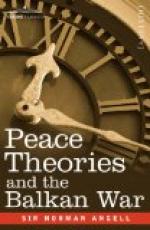So far as I am concerned, I have never written a line, nor, so far as I know, has anyone else, to plead that war is impossible. I have, on the contrary, always urged, with the utmost emphasis that war is not only possible but extremely likely, so long as we remain as ignorant as we are concerning what it can accomplish, and unless we use our energies and efforts to prevent it, instead of directing those efforts to create it. What anti-Bellicists as a whole urge, is not that war is impossible or improbable, but that it is impossible to benefit by it; that conquest must, in the long run, fail to achieve advantage; that the general recognition of this can only add to our security. And incidentally most of us have declared our complete readiness to take any demonstrably necessary measure for the maintenance of armament, but urge that the effort must not stop there.
One is justified in wondering whether the public men—statesmen, soldiers, bishops, preachers, journalists—who indulge in this gibe, are really unable to distinguish between the plea that a thing is unwise, foolish, and the plea that it is impossible; whether they really suppose that anyone in our time could argue that human folly is impossible, or an “illusion.” It is quite evidently a tragic reality. Undoubtedly the readiness with which these critics thus fall back upon confusion of thought indicates that they themselves have illimitable confidence in it. But the confusion of thought does not stop here.
I have spoken of Pacifists and Bellicists, but, of course, we are all Pacifists now. Lord Roberts, Lord Charles Beresford, Lord Fisher, Mr. Winston Churchill, The Navy League, the Navier League, the Universal Military Service League, the German Emperor, the Editor of The Spectator, all the Chancelleries of Europe, alike declare that their one object is the maintenance of peace. Never were such Pacifists. The German Emperor, speaking to his army, invariably points out that they stand for the peace of Europe. Does a First Lord want new ships? It is because a strong British Navy is the best guarantee of peace. Lord Roberts wants conscription because that is the one way to preserve peace, and the Editor of The Spectator tells us that Turkey’s great crime is that she has not paid enough attention to soldiering and armament, that if only she had been stronger all would have been well. All alike are quite persuaded indeed that the one way to peace is to get more armament.
Well, that is the method that mankind has pursued during the whole of its history; it has never shown the least disposition not to take this advice and not to try this method to the full. And written history, to say nothing of unwritten history, is there to tell us how well it has succeeded.




